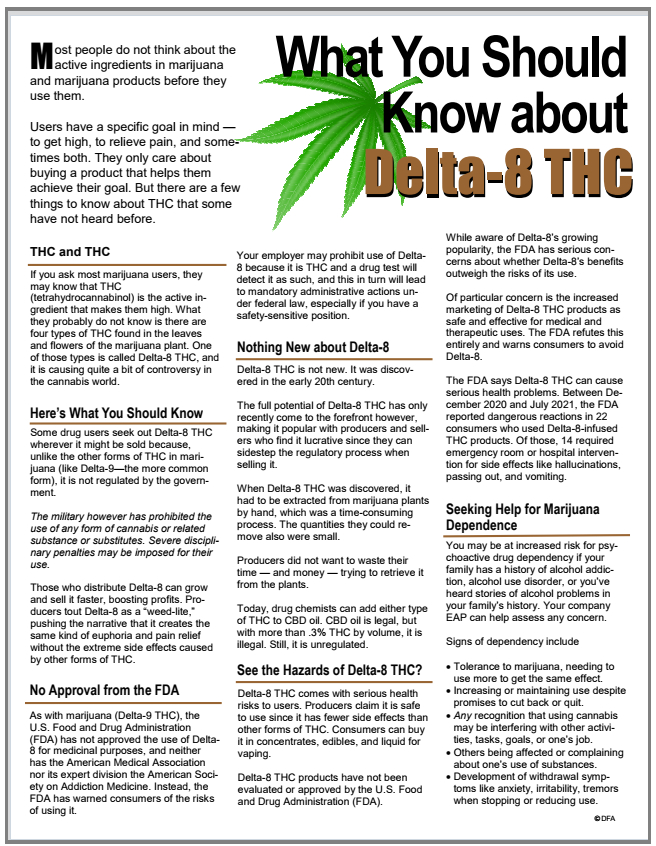- Home
- What You Should Know Delta 8 THC Cannabis
What You Should Know Delta 8 THC Cannabis
What You Should Know Delta 8 THC Cannabis
Download full zip package of tip sheet Download the PDF
Download the PDF
Download catalog of all tip sheets
Email us
What You Should Know About Delta-8 THC
Most people do not think about the active ingredients in marijuana and marijuana products before they use them. They have a specific goal in mind — pain relief, recreational high — and only care about buying a product that helps them achieve their objective.
If you ask most marijuana users, they may know that THC (tetrahydrocannabinol) is the active ingredient that makes them high. What they probably do not know is there are four types of THC found in the leaves and flowers of the marijuana plant. One of those types is called Delta-8 THC, and it is causing quite a bit of controversy in the cannabis world.
Delta-8 THC (delta-8-tetrahydrocannabinol) is a psychoactive cannabinoid found in the cannabis plant. It is similar in structure to delta-9 THC, the main psychoactive compound in cannabis, but with some differences in effects and potency.
Delta-8 THC is produced in smaller amounts than delta-9 THC in the cannabis plant, but it can be extracted and concentrated for use in various products, such as tinctures, edibles, and vape cartridges. It has been reported to have similar effects to delta-9 THC, including euphoria, relaxation, and pain relief, but with less anxiety and paranoia for some users.
It is important to note that delta-8 THC is still considered a controlled substance in many jurisdictions, and its legal status can vary depending on the location. It is recommended to check local laws and regulations before using or purchasing delta-8 THC products.
Employees should be careful about using delta 8 THC because it can potentially cause impairment and affect their ability to perform their job duties safely and effectively. Even though delta-8 THC may have less anxiety and paranoia for some users compared to delta-9 THC, it can still have psychoactive effects and impair cognitive and motor functions.
Delta-8 THC can also potentially trigger a positive drug test for THC, which can be a concern for employees who are subject to drug testing, such as those in safety-sensitive positions or those who work in industries that have a zero-tolerance drug policy.
Additionally, the legality of delta-8 THC is still a grey area in many jurisdictions, and it can be a risk for employees to use it, especially if it is not legal in their state or country. This can potentially lead to disciplinary action or termination from their job.
Therefore, employees should be careful about using delta-8 THC and should consider the potential risks and legal implications before using it, especially if they are subject to drug testing or have safety-sensitive job duties.
Marijuana addiction, also known as cannabis use disorder, is a condition characterized by compulsive use of marijuana despite the negative consequences it may have on one's health, relationships, work, or other areas of life. If someone is struggling with marijuana addiction, they should seek treatment as soon as possible to address the issue and improve their quality of life.
- Some signs that may indicate the need for treatment for marijuana addiction include:
- Difficulty controlling marijuana use or stopping despite attempts to quit
- Spending a lot of time and money on obtaining and using marijuana
- Neglecting responsibilities and activities due to marijuana use
Continuing to use marijuana despite negative consequences, such as relationship problems, legal issues, or health problems
Developing tolerance to marijuana, requiring increasing amounts to achieve the desired effect
Experiencing withdrawal symptoms when attempting to stop or reduce marijuana use, such as irritability, insomnia, anxiety, or cravings
If someone is experiencing these symptoms or any other negative consequences related to marijuana use, they should consider seeking professional help for their addiction. Treatment options for marijuana addiction may include counseling, behavioral therapies, support groups, and medication-assisted treatment.
It's important to note that seeking treatment for marijuana addiction is not a sign of weakness, but a courageous step towards recovery and a better life.
 Loading... Please wait...
Loading... Please wait...

